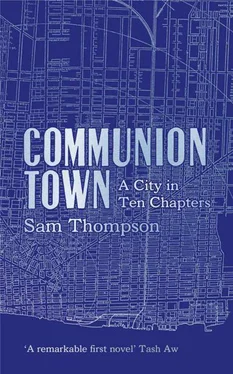The Inspector’s greeting was gruff as usual, but he was evidently in a state of some agitation, short of breath and sweating in spite of the cold. Beads of moisture clung to his leather car-jacket. He looked around the clutter of the office.
‘Dr Fetch not here? You don’t know his whereabouts?’
He swallowed, the point of his throat leaping.
‘Then I fear the worst.’
Having witnessed several investigations in which the constabulary, reaching the limit of their own wit, had begged Peregrine’s assistance, I had learnt to set but modest store by Inspector Nimrod’s deductions. But there was a grim note in his voice tonight which I did not find easy to dismiss.
‘What do you mean, inspector?’
‘I’ve never known a night like it,’ he said. ‘It’s beyond me, I don’t mind telling you, Ms Byrd. I thought I was losing my marbles back there and I’m still not sure I was wrong. Bleeding Lord, if they’ve got him too …’
But before he could continue, a soft voice wished us good morning and we turned to see, standing in the doorway, the slight figure of Peregrine Fetch. The inspector sagged with relief. Peregrine’s hair, I noted, was disordered and dirtied, his left cheekbone and right knuckles sticky with fresh blood, and the sleeve of his raincoat torn, but he met us with a half-smile.
‘They used to say that, in the city, as many deaths await you as there are windows open above your head.’ His diction was light and precise. ‘I can fairly claim that since you saw me last I have tried the truth of that proposition.’
‘You were attacked?’
‘Yes,’ he said, sounding as if he had not quite thought of it in those terms. ‘Certainly, I have been attacked.’
I began to ask him what had happened, but he raised a punctilious finger.
‘Never fear: in due course I will unfold this further. But first, perhaps, the inspector has his own story to tell?’
Nimrod, who had been listening open-mouthed, found his tongue.
‘I wish it wasn’t so,’ he said, and drew a deep breath. ‘But yes. I’m certain of that, if of nothing else I’ve seen.’
It had been a punishing night for the inspector. He had been called from his bed to the scene of a murder. This in itself was not so unusual an occurrence; but no sooner had he laid eyes on the corpse than news arrived of another killing, a second ugly spectacle which he had barely surveyed when he was summoned away to the aftermath of yet a third homicide. Three murders. Death, it appeared to Nimrod, was opening its grisly blooms across the city as if its season had arrived. There was nothing in their manner or location to link the killings, but when he realised what they did have in common, the inspector, gripped by fresh dread, had turned on his heel and made all haste to the consulting rooms of Peregrine Fetch.
‘The victims,’ said the inspector, ‘were all —’
‘Please,’ said Peregrine. ‘Allow me. They were all of my profession. The murdered individuals were my fellow private consulting detectives.’
He said three names: the names of the three foremost investigators in the city, besides Peregrine himself. He gave Nimrod an inquiring look; the inspector’s shake of the head was a gesture not of negation but of bafflement.
‘Yes,’ said the inspector. ‘Hyperion Weill, Electra Cavendish-Peake, Brutus Thorne. Three of the leading private detectives in the city have been murdered tonight. How did you know?’
Without removing his raincoat, Peregrine dropped on to the Chesterfield and stretched out full length, adopting the position in which, motionless, with eyes closed, ankles crossed and fingers laced on his sternum, he had solved many of his more arduous cases.
‘It is as I anticipated,’ he said. ‘To begin with: you are both familiar, of course, with the name of Lazarus Glass.’
We were. For anyone concerned with the city’s criminal element, Lazarus Glass moved in the mind like a shadow, never quite absent. Such was his reputation that he seemed not so much a man as a fable, a splendid monster: his infinite hunger for malfeasance, his genius for cruelty, his mastery of disguise and misdirection, the patience with which he executed his stratagems, all of these were recounted in whispers by common criminals and ordinary policemen alike — and they spoke, too, of the man’s consuming hatred for his enemy, the detective who so often stood in his way, Peregrine Fetch.
No street or house was safe from Lazarus Glass, and not one citizen, bad or good, rich or poor. His tendrils linked the city’s lowest robbery with its most grandiose jewel theft or political assassination. His name seldom appeared in the news, his face never, but Peregrine had many times assured me that Glass, through his manifold indirections, was behind the greater portion of the crimes it had fallen to my mentor to combat. And however often Peregrine thwarted the particular villainies which betrayed the presence of that hand on the strings, he had never come close to apprehending the puppeteer.
Never, until now. Lying on the sofa Peregrine resembled a recumbent statue on the tomb of a crusader. Without opening his eyes, he explained that, after months and years of hunting, of feint and counterfeint and invisible chessplay, he had at last found a route into the maze of defences with which Lazarus Glass surrounded himself, and had taken up the chase. He could not have hoped to succeed alone: he had joined forces with three other investigators, the bravest and most brilliant of the profession. Together they had closed the net around Glass by slow degrees, and tonight they had been on the point of drawing it fast. But the man was tenfold a devil when cornered, and it was no surprise that, in spite of all their precautions, he had struck against his pursuers with a violence testified by the sickly shade of the inspector’s face.
‘You’re telling me it’s Glass,’ said Nimrod. ‘In a single night he’s wiped out three of the best private detectives in the city, and come close as dammit to doing the same to you too?’
‘This would appear to be the reasonable inference,’ said Peregrine. Only the soft voice showed that he was not asleep. ‘Nor is there reason to suppose that the attempt is at an end, given that I remain —’ he opened one eye ‘— active.’
‘Then there’s no time to waste. I’m placing you under police protection. We call for reinforcements.’
Peregrine sprang to his feet in a single movement.
‘By no means, inspector. Do you think it is beyond the powers of Lazarus Glass to infiltrate the ranks of the law? Tonight I trust three people only and they are in this room. We will do well to move fast and inform no one of our plans. Cassandra, I must ask you to come with me. Nowhere is safe for any of us with Lazarus Glass so close behind, and I feel I may have need of your help in this affair.’
I rose.
‘Besides,’ he continued, ‘three murders have been committed tonight. Our place is at the scenes of the crimes: there, if anywhere, we will find clues to the intention of our adversary.’
‘It’s against my better judgement,’ said Nimrod, shaking his head in acquiesence.
‘Think how many of our shared triumphs have been accomplished in just such a mode, inspector, and lead on.’
As we were leaving the consulting rooms, Peregrine moved to the mantelpiece and opened the old cigar box that stood there. Inside it, I knew, was a revolver. He stored it in the box as a matter of habit, keeping it cleaned and loaded but never taking it with him on investigations. I had never known him to use it, nor any other weapon. He kept the gun accessible, I believed, as a daily reminder that he had no need of it — that he chose to face the dangers of the city armed with reason alone. Now his hand lingered over the box, but he did not touch the weapon. Instead he closed the lid and turned to me. He seemed to search for words.
Читать дальше
Конец ознакомительного отрывка
Купить книгу












